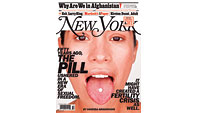
1. In last week’s cover story, Vanessa Grigoriadis looked at the history of the birth-control pill on its 50th anniversary and analyzed the unexpected consequences it may have on fertility (“Waking Up From the Pill,” December 6). Grigoriadis’s thesis, that use of the Pill beginning in adolescence may lead women to disconnect from their biology and (inadvertently) put off conceiving until it’s too late, triggered something of a feminist backlash. “The notion that nature is somehow better, and that women can’t know about it unless they tolerate a higher chance of unintended pregnancy, is the real problem here,” wrote Amanda Marcotte at Slate’s Double X blog. Imagine attacking men, Marcotte wrote, for taking drugs they feel they need: “Statins are unnatural too—Mother Nature intended you to get in touch with your heart attacks; that’s why she gave them to you.” Other readers found the idea that women don’t understand their own bodies condescending, while a commenter on nymag.com thought Grigoriadis overstated her case. “The issue of women waiting longer, in some cases too long, to have a baby is very real. However, does that mean the Pill is directly responsible? Does the Pill cause woman to ‘forget’ that fertility decreases as they age? That’s a big leap, and I don’t think the author makes it successfully.” But Grigoriadis also had plenty of defenders. “Any indication that the Pill isn’t the key for freedom for women will always fall under serious attack,” wrote a twentysomething commenter. “It’s not that women are clueless that getting older diminishes your chances of getting pregnant. It’s that being on the Pill makes it easier to make that small, daily decision to put it off.” “The freedom to choose brings with it the obligation to face the consequences. Shouting it down won’t change this basic fact,” added another. “I personally agree with Grigoriadis,” wrote the blogger at The Frisky. “We don’t take responsibility for understanding our bodies and how they work because, on the whole, we aren’t encouraged—by schools, parents, society, ourselves—to understand our biology. We assume doctors will just take care of it. And a lot of the information we receive is just wrong. Because modern Western medicine is successful in so many ways, we have become increasingly ignorant about how our bodies operate and, perhaps, developed a false sense of security about how to control our health.” Grigoriadis herself responded on Double X to Marcotte’s post. “I do think that feminism needs to take into account that a lot of thirty- and fortysomething women are losing two or three years in a desperate struggle to conceive late in life,” she wrote. “Women aren’t ‘dumb,’ of course—it’s just that no one thinks infertility will happen to them. We think we can’t possibly fall into that group, because falling into it is just too painful to even consider.”
2. Readers were happy to read about the return of actress Kirsten Dunst after rehab (for depression) and a hiatus from Hollywood (“Beyond Cute,” by Tom Shone, December 6). “Super-insightful analysis on the many reasons we love Dunst,” gushed a commenter on nymag.com. “It’s good to see her getting the respect she deserves.” “She gets a lifetime pass just for Bring It On,” added another. Others disagreed about the categorization of Marie Antoinette as a flop: “I liked Marie Antoinette a lot. I think most people expected it to be an accurate biopic about the life of the French queen, when it was really much more brilliant than that.”

3. In Benjamin Wallace’s profile of Tom Barrack, the real-estate investor turned savior of debt-ridden celebrities (“Monetizing the Celebrity Meltdown,” December 6), two points require clarification. First, the article notes that Michael Jackson gave the rights to his catalogue to the son of the king of Bahrain. It was not the full catalogue he signed over but rather rights to various recordings and performances. It was also stated that as of 2008, it had been thirteen years since Jackson had toured or released an album. In fact, Jackson released Invincible in 2001, and went on a world tour in 1996–97.
Send correspondence to: [email protected]